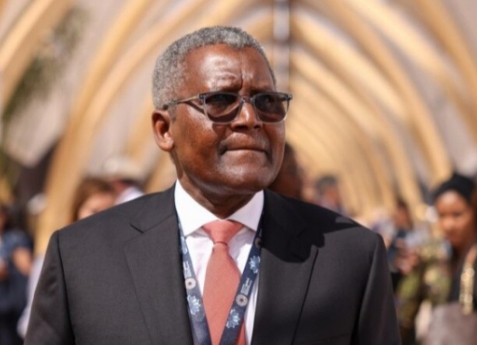Billions at Stake: Africa’s Richest Man Clashes with Nigerian President Over Oil Refinery Monopoly Allegations
A bitter impasse is brewing between Aliko Dangote, Africa’s richest man, and the President Ahmed Bola Tinubu’s administration, threatening the continent’s largest economy.
Dangote has abandoned plans for a massive $20 billion steel mill in Nigeria, fearing accusations of monopoly, amidst a dispute over his massive oil refinery project.
The Nigerian government has accused Dangote of seeking a monopoly with his refinery, which could produce 650,000 barrels of oil per day, making it the continent’s largest.
The government claims that Dangote is trying to ban diesel imports to boost the viability of his plant, and has questioned the quality of its fuel.
However, Dangote counters that the state oil company has reneged on a deal to supply his refinery with 300,000 barrels of crude oil per day.
“Building a refinery like this is supposed to be a pride for everybody,” Dangote said, accusing the regulator of wanting to continue issuing import licenses for fuel, a lucrative source of income for Nigeria’s elite for decades, instead of allowing his refinery to thrive.
The dispute has sparked concerns about the fate of Dangote’s refinery and the impact on ordinary Nigerians, who may face higher fuel costs.
Without the refinery, Nigeria – Africa’s largest crude-oil producer – will need to import almost all of its motor fuel.
According to Antony Goldman, founder of Promedia Consulting, a political risk-advisory firm, “Access and favors matter. And Dangote, in cement, was always accused of benefiting from a monopoly.”
Goldman notes that some critics fear a monopoly but fail to mention the status quo, which relies heavily on imports, importers, and intermediaries.
This clash of titans is unlikely to have a winner, and Nigerians will likely bear the brunt of the consequences.
The standoff has significant implications for Nigeria’s economy, which has struggled to attract investment.
The fate of Dangote’s refinery, the continent’s largest, hangs in the balance, and the outcome will have far-reaching consequences for the country’s energy sector and its people.


Nigeria should allow this refinery to work and produce petroleum products for us if the government mean well for it citizens.
There’s no need for issuing import license for importation where we have a refinery that can give products within the country.
You message has been acknowledged.